Service Design Award 2020/21 Winner
Best Student Project
Escuela sin Fronteras - by Catalina Hepp
Category: Student
University: Design School of Pontificia Universidad Catolica de Chile
Location: Chile


Developing intercultural practices and attitudes in public schools
Category: Student
University: Design School of Pontificia Universidad Catolica de Chile
Location: Chile
Escuela sin Fronteras is a graduating project developed between August 2018 and July 2019 in Santiago Chile. It aims to improve intercultural relationships within schools by developing practices and attitudes in teachers and students, using theatre to promote empathy, collaboration and
reflection.
This was done in collaboration with an ONG, a guiding professor, and a team of experts in education, interculturality and applied theatre.
In the last few years Chile has experienced growing inmigration, in part due to the economic and political stability, but also due to the various conflicts and poverty that affects countries in the region. Local authorities estimate 1.251.225 migrants live in Chile, which represents 6.6% of the
total population (DEM, 2018).
This shows a great increase compared to 2014, when the migrant population was 305.212, which means the number of foreign people has more than triplicated in just four years. The increase in migration has had a huge impact on a social, economic and political scale, forcing authorities to revise migration laws and offer services that adapt to this new population. One of the most affected areas has been the education system, because as migrants settle in and bring their families, thousands of children enter the public education system.
The increase of diversity inside schools has led to new conflicts, as students tend to replicate racist practices they see and hear in their homes and the media, leading to bullying, stereotypes and segregation inside the classroom (MINEDUC, 2018). Most of the time, institutions and teachers lack the resources or tools to face these issues, preventing them from creating intercultural and inclusive spaces that promote learning for migrant students.
Education has proven to be one of the best mechanisms for migrant families to adapt to their new home. Schools play a vital role in promoting inclusion, as they have the potential to teach students how to live interculturally in diverse communities. This means not just coexisting with other cultures, but actually engaging and communicating, being open to new perspectives, and resolving conflicts through dialogue. (Unesco, 2016).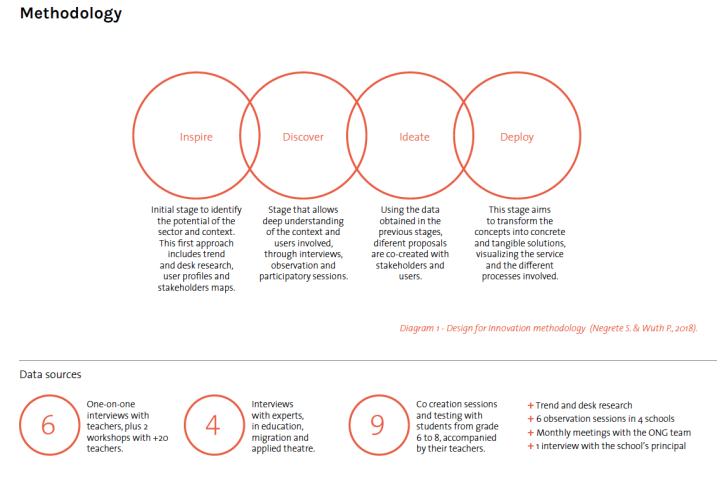
The participating ONG had been working with intercultural education for over a year, generating surveys and workshops in two elementary schools. They had faced several obstacles, such as the lack of engagement of teachers and students, the impact accomplished and the difficulty scaling the program.
The challenge consisted in diagnosing the situation and revising the workshops developed by the ONG, so a new proposal could be designed.
Outcomes and Objectives
Escuela sin Fronteras (School without borders, in english) aims to improve intercultural relationships within schools by developing practices and attitudes in teachers and students, using theatre to promote empathy, collaboration and reflection. The project worked with an ONG specialized in education and migration to develop a new program, adapted to Chile’s public schools system and migrant students experiences. For the initial pilot the program was focused on students and teachers from grade 6 to 8.
Methodology
For this project an intercultural approach and rights-based perspective was established, valuing migrant rights as human rights. Also adult-centric practices were revised, especially when working with children and teens. The project used the Design for Innovation methodology (Negrete S. & Wuth P., 2018). The process consisted of four stages: inspiration, discovery, ideation, and projection.
Inspire
During this stage, desk research was used to analyze different references, context data and case studies surrounding migration and education in Chile. Then, interviews were conducted with experts, such as teachers, municipal workers and migration specialists to better understand how different institutions were tackling this issue. These helped identify the key actors involved, allowing the project to integrate different dimensions of migrant students, while also helping connect with important allies, such as an education and migration ONG, who then decided to participate in the
project.
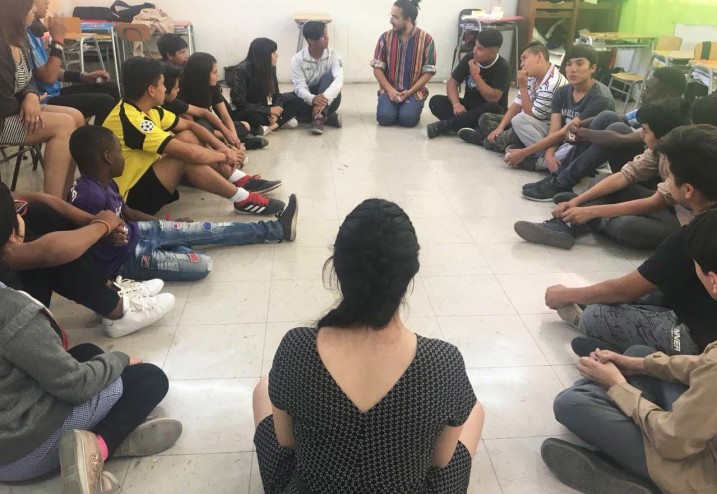
Discover
This stage involved intense field work, working with two different public schools with high rates of migrant students. Participatory observation was used, during classes and recess, and several teachers were interviewed to analyze their perspective on intercultural education and conflicts. These
interviews were individual and grupal, and aimed for teachers to identify their own prejudices and stereotypes. Participatory sessions helped them to feel less exposed when dealing with this sensible issue.
Furthermore, a collaborative session was developed with the ONGs team to better understand their work with students and identify the main issues or breaks in their experience. A journey map of their experience was developed based on observation and transformed into a board game. The team then played and analyzed possible alternatives to their work. Here the team’s strengths were identified, and theatre emerged as a tool for intercultural education. Many of the ONG volunteers were trained actors, and proposed theatre as a way to develop empathy, collaboration and reflection, all key elements for interculturality.
This was supported by a new bibliographical review and interviews with experts, who have used applied theatre techniques to promote empathy in diverse contexts and audiences.
Ideate
Ideation consisted of iterative design and prototype. Insights developed in earlier stages were presented to the ONG, teachers and students, who participatedin co-creation sessions to generate design proposals. A preliminary program was created and tested with three different grades, using a MVP logic to test the key elements of the service. This allowed constant learning for the team and several adaptations were made in the next two
months.
Testing with students was conducted through 9 different sessions, 3 which each grade. The sessions included role playing, brainstorming, and group discussions, and aimed to prototype workshops included in the program, but also co-create new strategies to promote interculturality inside
the schools. These sessions led to important insights, such as the need of teachers’ participation to create sustainable learning, the value of group work and roles within the students, and the importance of the socialization of the outcomes.
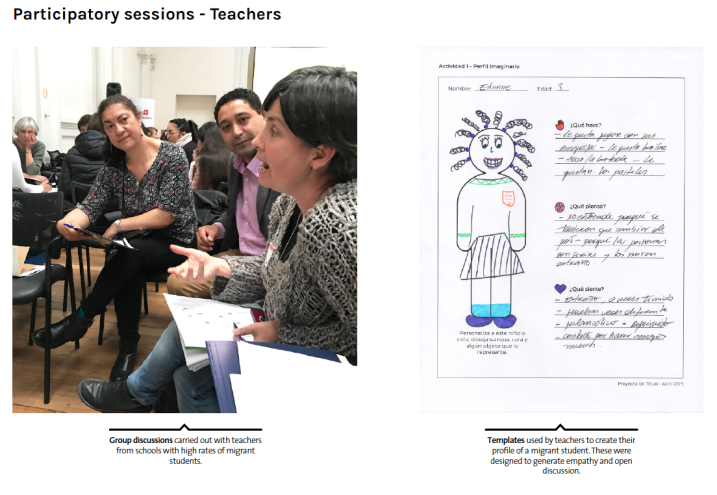
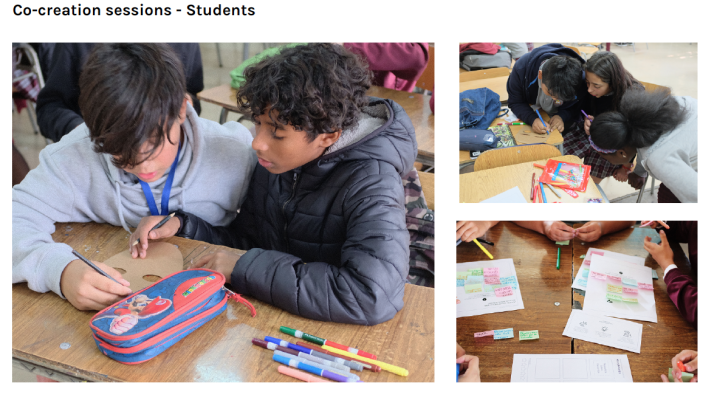
Deploy
This final stage consisted on the creation of a blueprint and design brief. The final blueprint collected all insights obtained during prototyping and testing. This blueprint also included several observations from experts and participants, and was adjusted to the ONGs budget. The design brief, on the other hand, included guides for the team and facilitators, graphic specifications for the brand and a pilot plan for the implementation of the program.
The final service consisted of a 6 month program divided into three stages: recognize, respect, reconcile and realize, identifying the steps needed for intercultural education. It changed the focus from migrant students to the whole school community, integrating teachers and families in the learning
process. It reinforced the workshops offered by the ONG by putting theatre in the center and creating a narrative that gives continuity to each session.
Monitors are now seen as facilitators and invite students to actively participate, according to the role they choose (screenwriter, narrator, actor,
etc). This change was key when working with teenagers, as some were very shy and refused to participate in protagonist roles.
The importance of continuity was recognized by assigning ambassadors, both teachers and students, who can continue promoting interculturality once the program is over. This ensures the sustainability of the practices and attitudes developed by the program, and creates a community that serves as support in the learning process of interculturality.
A key touchpoint designed for this service was the facilitators kit, a tote bag that included the script and materials for each session. The kit also included preliminary activities and assessment cards, that allowed monitors to introduce and close every workshop. Another important keypoint
is the teacher’s journal, a small notebook that aims to keep teachers involved and allows them to record the class progress.
Finally, circular business model was proposed, based on Turetken & Grefen (2017), where value is co-created between the different actors involved and income comes from a mixed model, as half the price of the program is paid by the schools and the other half is paid by donations.
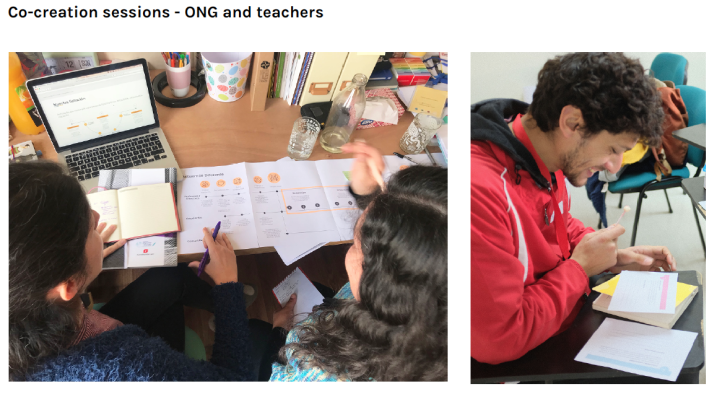
The output of this program included:
Stage 1 - Inspire
Stage 2 - Discover
Stage 3 - Ideate
Stage 4 - Deploy
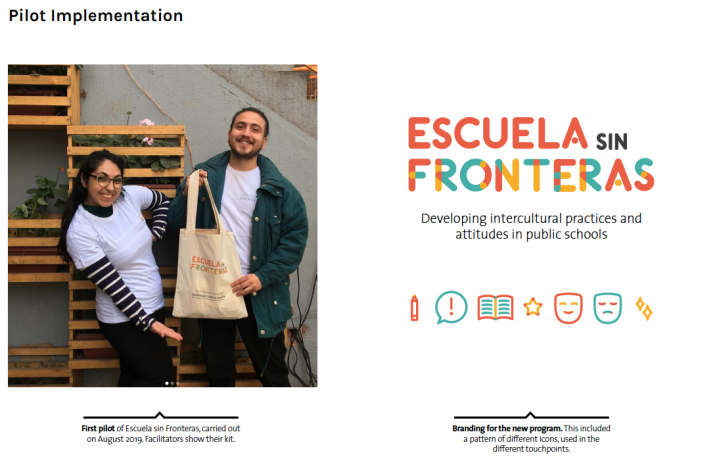
A survey was developed to measure intercultural conflicts before and after the pilot. This showed an improvement of 30% in positive perspective towards migration and 53% of an improvement in internal climate. Also teachers reported a decrease in bullying and conflicts, and students claimed
these workshops helped them make new friends.
The project won a US$5,800 fund awarded by Enseña Chile, focused on educational innovation. This allowed the pilot to continue at no cost for the schools and represented a validation of the new service proposal, specially for school principals.
It also allowed the expansion of the program from two to six schools, which meant reaching over 180 children and their teachers, and developing an intercultural community in each school.
Unfortunately, the implementation of the program was interrupted by the social protests occurred in october 2019, and then by the sanitary crisis produced by COVID19. This compromised the impact of the service, as classes have been constantly interrupted and are now canceled in all the country.
Escuela sin Fronteras has a great potential, not just educating students and teachers, but changing the perspective and conversation around migration. Through an intercultural perspective the program invites all people to promote empathy, collaboration and reflection, and differentiates itself from other programs that just help migrants adapt.
This project also recognized the ethical implications of working with children in vulnerable contexts, and developed tools and sessions that allowed them to be actively involved in the design process. The tools used, such as role play, brainstorming and group discussions were greatly valued as it empowered students to solve problems that impact their daily life and are rarely used in Chilean public schools.
Finally, the participatory process allowed the ONG to identify the value of service design tools and methodologies, which were previously unknown for most of the team. Thanks to the intense collaboration process, the team was able to acquire internal capacities to develop their own innovation
process.
The ONG has now adjusted some of the tools used in this service to work with a wider range of people, including kindergartens and professionals. This project helped them understand better the work they wanted to do, and the best way to approach it.
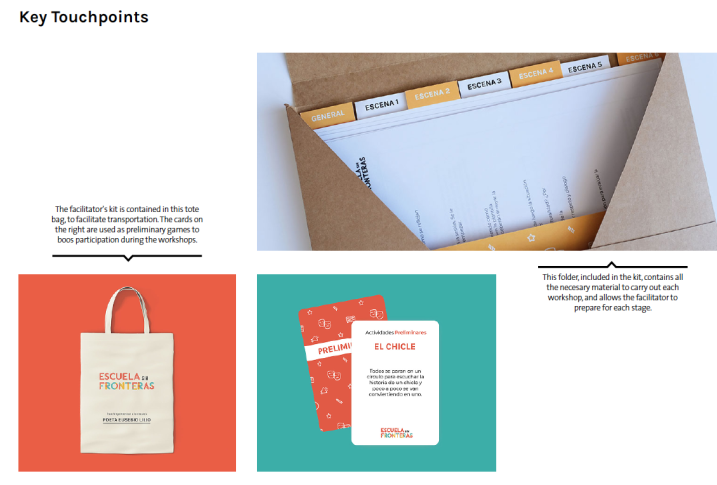

Service Design Award 2024 - Student Finalist
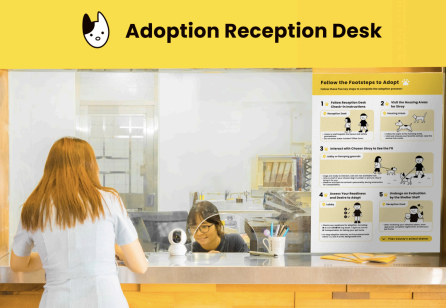
Service Design Award 2024 - Student Finalist
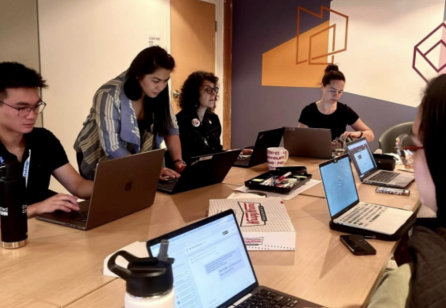
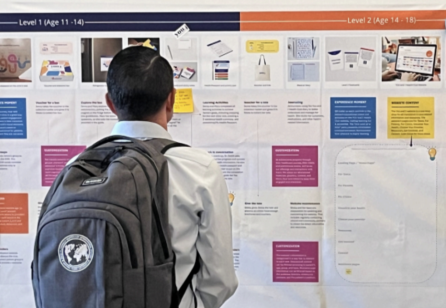

Share your thoughts
0 RepliesPlease login to comment